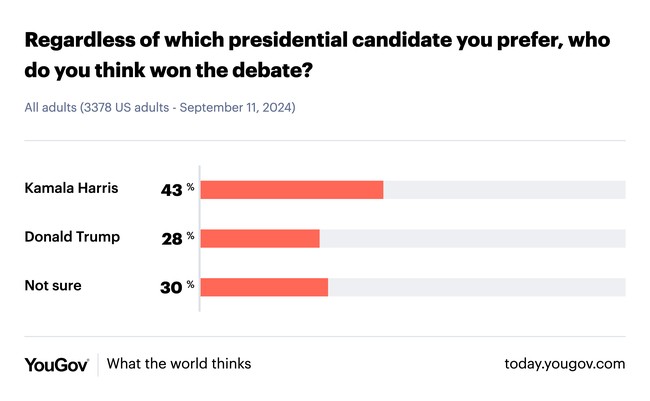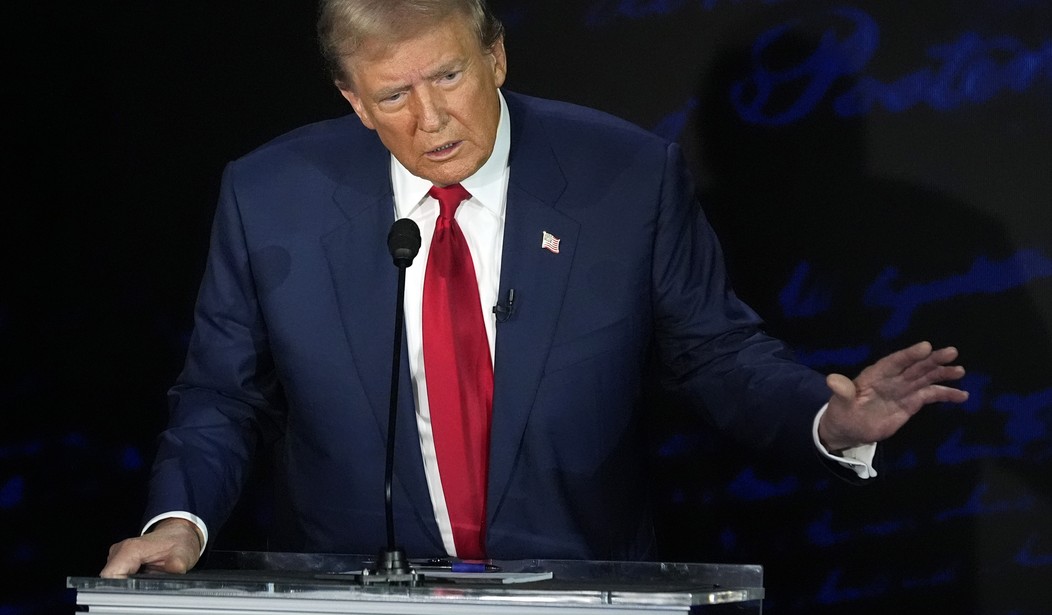Even before we all went to bed last night, the media's debate narratives began to form. Kamala Harris got Donald Trump angry! She got under his skin! Harris "walloped" him, as Politico wrote this morning. Even conservative media outlets spent the morning in gloom and doom, mulling over all of the ways in which Trump arguably fell short.
Well, maybe. But don't don the Depends just yet, because most of that Harris joy is simply a kind of irrational exuberance, almost all of which arises from the contrast to the previous debate. Trump didn't knock Harris out of the race like he did to Biden, and that qualifies as a victory of sorts for Democrats.
But how much of a victory? And for how long? Much of that depends (heh) on the media and whether they will force Harris to start engaging them normally after this debate. And much of it relies on whether the voters who watched last night believe that the months-old Democrat strategy to disqualify Trump rather than run on the Biden-Harris record has suddenly turned convincing.
Harris did succeed in keeping up with Trump's pugilism. She also mainly avoided word salads and appeared prepared to discuss some issues in broad strokes. Harris also didn't get asked about any specifics on her policies, not even the "price gauging" policy she unveiled less than a month ago. As far as tests go, this one was made fairly easy by ABC News' clear hostility toward her opponent.
More importantly, Harris did what she needed to do -- keep the focus on Trump as much as she could, rather than herself. Trump offered her a couple of openings for that purpose that he could have avoided by refusing to engage on ABC's line of questioning, which leaned hard into his negatives and Harris' relative positives.
Did Trump do what he needed to do? He certainly tried to keep the focus on the Biden-Harris record, in nearly every answer. Trump could have done better on focusing attacks on Harris' flip-flops, which ABC's questions touched on but didn't demand explanations from Harris. He did try to remind voters of her radical past (and likely present), but he could have done more and offered more specifics on those. And for the most part, Trump remained disciplined and avoided personal attacks, even when Muir tried to goad him into a debate over Harris' identity -- a question he should have repudiated entirely rather than engage, even to the limited extent he did.
Trump may not have been effective enough in all of these efforts for that to break through. But then again, he was debating three people on stage, not one, and part of his effort went into responding to Muir and Davis as well. How much did Trump have to deal with it? Ryan Saavedra offers us a count:
Went through the debate transcript and counted:
— Ryan Saavedra (@RealSaavedra) September 11, 2024
Trump was fact-checked 4 times
Harris was fact-checked 0 times
Muir/Davis pressed Trump 6 times for follow-ups
Muir/Davis pressed Harris 0 times for follow-ups
Trump made ≈14 false statements
Harris made ≈16 false statements https://t.co/CDdv7xxigp
Small wonder that Trump looked "angry, defensive, and rambling" at times. And he did. To some extent, it doesn't matter why that happened, but just that it did, and I get that. However, even then, Trump remained pretty disciplined, and pretty much himself. For that matter, Trump also looked "angry, defensive, and rambling" at times during the debate with Biden, in the second half a bit more than the first, and ... no one seemed to care as much.
Why? Because that's Trump; it's who he is. His whole "fighter" approach makes him look angry and defensive in any public context. That's who Trump is, and expecting him to transform into a MAGA version of Hubert Humphrey is pretty unrealistic, to say the least.
Somewhat lost in this discussion is how Trump managed to control the debate tactically, despite the three-on-one tag-team match into which it devolved. Politico's Ally Mutnick noticed that Trump made sure to get the last word in every topic, even when Muir and Davis tried to prevent it from happening:
Donald Trump, throughout the debate, managed to get the last word over and over again.
In fact, by our unofficial count, he spoke last on every topic the moderators broached during the debate, often interjecting forcefully when they tried to move on.
Trump also saved his best attack for his closing statement. He left voters to think about this:
So, she just started by saying she's going to do this, she's going to do that, she's going to do all these wonderful things. Why hasn't she done it? She's been there for 3 1/2 years. They've had 3 1/2 years to fix the border. They've had 3 1/2 years to create jobs and all the things we talked about. Why hasn't she done it?
Still, Harris succeeded more in her strategic necessities than Trump did. She got a lot of help in doing so, but Harris took advantage of the opportunities ABC News handed her. YouGov's spot poll reflects that, but also hints at its limited impact:
 Harris has a clear plurality in this reaction poll, but that's about it. Much of that difference comes from Democrats breathing a sigh of relief; 81% of Democrats surveyed in this poll think she won, as compared to 62% of Republicans choosing Trump as the winner. It's closer among independents, though, and this is where the limits of this debate can best be seen. Only 35% of indies think Harris won, while 44% are unsure, with 21% choosing Trump. Interestingly, only 44% of women think Harris won the debate, while 32% are unsure -- not exactly the kind of game-changer Harris must have thought she'd won. (It's almost identical among men, 42/31/27 unsure.)
Harris has a clear plurality in this reaction poll, but that's about it. Much of that difference comes from Democrats breathing a sigh of relief; 81% of Democrats surveyed in this poll think she won, as compared to 62% of Republicans choosing Trump as the winner. It's closer among independents, though, and this is where the limits of this debate can best be seen. Only 35% of indies think Harris won, while 44% are unsure, with 21% choosing Trump. Interestingly, only 44% of women think Harris won the debate, while 32% are unsure -- not exactly the kind of game-changer Harris must have thought she'd won. (It's almost identical among men, 42/31/27 unsure.)
Basically, we can assume that the two candidates have pretty much sewn up their respective bases. The debate doesn't appear to have left much of an impression on the independents in one way or the other, and that is where the election will be fought. This result, if representative (and it's a very large sample for an overnight poll), suggests that there won't be much of a change in the race after this debate, although we can wait to see what effect the spin will have.
The fundamentals of this election cycle still favor Trump. Harris still belongs to a deeply unpopular administration, and Trump has more trust on the issues that matter most to voters in this cycle -- inflation, immigration, crime, and national security. Trump needs to remain focused on those issues, and the rest of us need to put these game shows in the correct perspective.
Addendum: My pal Jim Geraghty is more pessimistic than I am about the debate, but on the same page about the impact:
So — again on paper — Trump was terrible, and you would think his poll numbers, nationwide and in the swing states, would nosedive. But what we saw Tuesday night wasn’t all that different from the same Trump we’ve seen year after year. And remember when Trump’s conviction was supposed to be a game-changer? The numbers barely budged.
Trump isn’t neck-and-neck in this race because Americans are charmed by his personality. He’s neck-and-neck in this race because of the national exhaustion with the Biden administration status quo, and frustration with inflation and the high cost of living, an insecure southern border, and a sense of growing chaos overseas. So, yes, in theory, this should have been a Harris knockout blow. But if this sort of contrast works, and one sort of performance is so much better than the other . . . why is Trump still so close to reaching 270 or more electoral votes?
I don't think he was as terrible as people think, largely because they expected Harris to fold like a cheap suit under pressure. Mike Pence tried to warn people about setting that expectation this week. Jim's correct, though, that the fundamentals haven't changed.









Join the conversation as a VIP Member